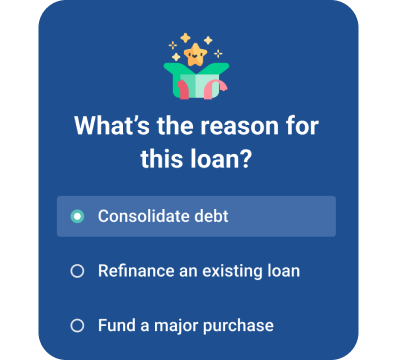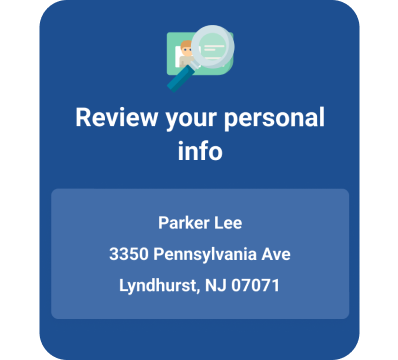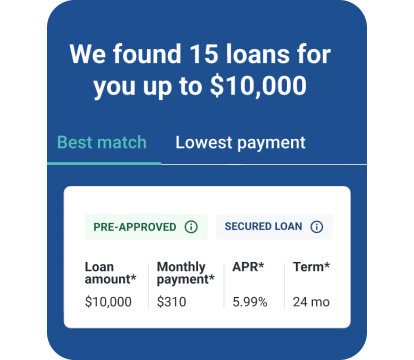In this article:
A personal loan is a versatile type of funding that can be used for almost any purpose, including unexpected expenses, large purchases or debt consolidation. You repay your loan with interest in fixed monthly installments. So, for instance, rather than slowly saving money over time for a much-needed home repair, you can take out a personal loan quickly to cover the repair, and then repay the loan in manageable payments.
While personal loans can help you achieve your financial goals, they're not always the best solution. Understanding what personal loans can be used for and how they work can help you determine if getting one makes sense for you.
How Personal Loans Work
Many banks, credit unions and online lenders offer personal loans. Some lenders allow you to prequalify online, which means you can view your rates without affecting your credit score. Prequalifying enables you to shop and compare offers to narrow down the best loan for your needs.
Generally, personal loans are unsecured, meaning they don't require any collateral. All personal loans come with terms, including:
- Repayment term: This is the number of years you have to repay the personal loan, typically one to five years. This number is sometimes reported in months, such as 24 months instead of two years.
- Interest rate: This is the percentage of the principal the lender charges you to finance the loan. The average interest rate for a 24-month personal loan is 8.73%, according to recent data from the Federal Reserve.
- The monthly payment: This is the total amount—including principal, interest and fees—you must pay each month to stay current on the loan.
Keep in mind, some personal loans come with origination fees that can range from 1% to 8% of the total you're borrowing. The fee for a $5,000 loan, for example, could range from $50 to $400. The amount for the origination fee can depend on your credit score and the repayment term on the loan. You may be able to avoid an origination fee by maintaining strong credit and comparing multiple loan offers.
Once you apply for a personal loan, the lender will check your credit history and credit scores, and analyze your cash flow to determine whether you can handle the payments. If you meet the personal loan requirements and the lender approves your loan, the money may be available to you within minutes or days, depending on the lender.
Find a personal loan matched for you
What Can I Use a Personal Loan For?
There are several reasons you may want to get a personal loan, some of which make more financial sense than others. Among the reasons you might consider taking out a personal loan:
- Debt consolidation: Consolidating old debts and high-interest credit cards with a lower-interest personal loan can save you money, especially if it doesn't come with an origination fee.
- Medical bills: Before taking out a personal loan, try to negotiate your medical bills down and see if a no-interest installment agreement is an option. If these strategies don't work, a personal loan may provide the funds to eliminate your medical debt.
- Home renovations and repairs: You can use a personal loan for remodeling projects, home improvements or necessary repairs, like installing new pipes or rewiring your house.
- Unexpected expenses: Ideally, your emergency savings fund can pay for unexpected expenses like a family emergency or an expensive car repair. But if you don't have enough cash to cover it, a personal loan might get you through a tough financial spot.
- Large purchases: When you don't have the cash upfront to buy that new computer, appliance, mattress or another item you may need, a personal loan can help you make the purchase. You can then pay off the loan over time with small payments.
- Moving costs: Moving to a new home can cost thousands of dollars, especially if you're moving long distance. If you don't have the available cash, you might consider a personal loan to cover moving expenses.
- Vehicle financing: Auto loans are likely a better option to finance a car as they typically offer lower interest rates than personal loans. Still, some may prefer using a personal loan because they usually don't require a down payment or collateral.
- Tax debt: You may be able to pay for your tax bill through an IRS installment agreement. Compare your loan's interest rate and fees versus the interest and penalties you'd accrue with an IRS installment plan to determine your best option.
What Personal Loans Can't Be Used For
Personal loans can be used for almost any reason, but lenders do restrict certain uses. Here are some instances when you shouldn't use a personal loan:
- College tuition: Most lenders prohibit you from using personal loans to pay college tuition and fees. Additionally, many lenders won't allow you to use a personal loan to pay off existing student loans.
- Down payment on a home purchase: You typically can't use a personal loan for a down payment on a home. Conventional and FHA mortgages forbid using personal loans as a down payment source.
- Business expenses: Many lenders do not allow you to use personal loan funds for business expenses. Small Business Association (SBA) loans, which offer borrowing amounts up to $5 million for qualified borrowers, may be a better option if you need significant capital upfront.
What Credit Score Do I Need for a Personal Loan?
Like other credit products, there is a direct relationship between your credit score and qualifying for a personal loan, as well as the interest rate you receive. As a rule, the better your credit score, the better your interest rates might be.
Check your credit score before applying to see where it stands. If your score falls in the 670 to 850 credit scoring range, your lender will consider your credit rating as good to excellent. As a result, the least expensive personal loan rates and terms could be available to you.
It's possible to qualify for a personal loan even if your credit scores are lower than you'd like. However, the interest rate will be higher than it would be for someone with a high credit score. The difference in the loan's ultimate cost can be dramatic. For example, if you take out a loan of $5,000 and it has a repayment term of three years:
- A rate of 5% will cost you $395 in interest
- A rate of 15% will cost you $1,240 in interest
- A rate of 25% will cost you $2,157 in interest
Of course, personal loan interest rates vary by lender, so you may get a better or worse rate even if your credit score stays roughly the same. You could save money by comparing rates for multiple lenders before choosing one for your loan.
Boost Your Credit Before Applying for a Personal Loan
As we've seen, your credit score directly impacts your eligibility for a personal loan, and the most favorable loan options are reserved for those with higher credit scores. As such, it may make sense to take the time to improve your credit before applying for a personal loan.
One quick way you may raise your FICO® Score☉ is by using Experian Boost®ø. This free feature allows you to add eligible on-time utility, cellphone and streaming service payments to your credit report, which could positively influence your Experian credit report and scores. You'll also be able to access your Experian credit report and credit score.
The average Experian Boost user who received a credit score boost increased their credit score by 13 points.




